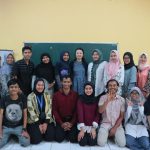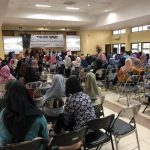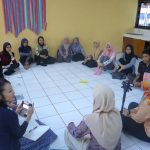News
2026.01.23
Generating Insights to Enhance the Quality of Inquiry Learning through Collaboration with Schools and the Private Sector
Center for Advanced School Education and Evidence-based Research (CASEER), affiliated with the Graduate School of Education, the University of Tokyo, and Education and Inquiry Co., Ltd. (headquartered in Chiyoda-ku, Tokyo; President and CEO: Kanji Miyaji; hereafter “Education and Inquiry”) launched a joint research project on November 1, 2025. This study aims to examine the current state of inquiry-based learning in lower and upper secondary schools and its impact on students’ learning experiences and attitudes.
This research focuses in particular on inquiry-based learning programs developed in collaboration with private-sector organizations. The project involves research design, data collection, and analysis, and the findings will be published in research reports and related outputs. By integrating CASEER’s academic expertise with the practical knowledge that Education and Inquiry has accumulated over more than 20 years of collaboration with schools, the study seeks to generate insights that contribute to improving the quality of inquiry-based learning.
Background
Inquiry-based learning has become widespread across lower and upper secondary schools in Japan, with practices becoming increasingly diverse. At the same time, there is a growing need to reassess and share—based on the realities of school settings—what kinds of approaches lead to what kinds of learning outcomes.
Education and Inquiry has supported students’ inquiry-based learning through programs such as Quest Education, developed in collaboration with companies, local governments, and educational institutions. Building on these practices, the research will involve surveys conducted at 20 schools during the current academic year, with plans to expand the scale in subsequent years.
CASEER is a research center dedicated to advancing school education and examining educational effectiveness through empirical research and dissemination. Through initiatives such as panel surveys conducted in collaboration with the Secondary School attached to the Faculty of Education, the University of Tokyo, CASEER has worked to visualize educational practices, including inquiry-oriented learning.
Through this joint research project, the two organizations aim to bring together their respective strengths to examine the realities and effects of inquiry-based learning from multiple perspectives. Looking ahead, the continued use of shared survey instruments may also enable longitudinal analyses of educational outcomes.
Overview of the Joint Research
-
Research Topic:
A Study on the Current State and Impact of Inquiry-Based Learning in Lower and Upper Secondary Schools
(with a focus on inquiry-based learning programs developed in collaboration with private-sector organizations)
-
Research Activities:
Research design / Data collection / Analysis / Dissemination of findings
-
Scale of the Study (planned):
20 schools in the current academic year
Research Team
Lead Researcher (CASEER)
Yuki Honda
Professor, Graduate School of Education, the University of Tokyo
Director, Center for Advanced School Education and Evidence-based Research (CASEER)
The realities of inquiry-based learning in educational settings are highly diverse, and there is a clear need to better understand these varied practices. At the same time, a certain proportion of schools, teachers, and students remain hesitant or disengaged in their approach to inquiry-based learning. For this reason, it is also essential to demonstrate—based on empirical data—why inquiry-based learning matters and what kinds of significance and educational effects it can have.
Although the present study focuses on a specific inquiry-based learning program, it seeks to control key elements of the content and instructional methods in order to collect data of sufficient scale from a large number of schools and students. Through this approach, the study aims to clarify how individual students’ modes of engagement, teachers’ instructional practices, and the dynamics of student teams are related to students’ perceptions of learning outcomes and self-awareness after completing inquiry-based learning activities. We believe that this research will contribute important empirical insights to the broader field of inquiry-based learning.
Lead Researcher from the Private Sector Partner
Sota Fukushima
Development Department Manager, Education and Inquiry Co., Ltd.
Inquiry-based learning has spread widely across Japan; however, the processes through which these practices lead to changes in students’ learning experiences and awareness have not yet been sufficiently examined or shared. In this study, we aim to re-examine both the realities and effects of inquiry-based learning by combining the accumulated practical knowledge that Education and Inquiry has developed in collaboration with schools with CASEER’s rigorous research design and analytical frameworks.
By carefully examining how factors such as individual students’ approaches to learning, teachers’ modes of involvement, and the ways in which learning activities are structured relate to students’ perceived learning outcomes and self-understanding, we hope to identify meaningful clues for enhancing the quality of inquiry-based learning. We believe that the reciprocal interaction between educational practice and academic research will enable a more multidimensional understanding of inquiry-based learning, and that the continued accumulation and dissemination of such findings as shared knowledge for both schools and society will form a foundation for advancing inquiry-based learning to its next stage.
Overview of the Joint Research Partner Organization
Education and Inquiry Co., Ltd.
-
Address:
Tōetsu Hakuyō Building 6F, 4-9 Yonbancho, Chiyoda-ku, Tokyo 102-0081, Japan
-
Established:
November 2004
-
President and CEO:
Kanji Miyaji
-
Business Activities:
Planning, development, production, and delivery of inquiry-based learning and human resource development programs—most notably the inquiry-based learning program Quest Education—as well as related training and professional development services for lower and upper secondary schools.
Contact Information
Center for Advanced School Education and Evidence-based Research (CASEER)
Email: c-kodoka [at] p.u-tokyo.ac.jp
2025.04.02
With the aim of supporting young researchers, the Center for Advancement and Effectiveness of School Education invites graduate students in the doctoral program of the Graduate School of Education once a year in the form of an open call for research projects and supports the implementation of research from a variety of perspectives.
This year, we are calling for research projects under the theme of “Expose the Challenges Facing Education”.
Download the Application Poster

Application Guidelines
Application Form
Please download from the link.
It can also be accessed through the Student Support Team (in charge of Graduate Studies) website.
Back numbers are here
Research Application Details
Academic joint research and individual research with originality on “Expose the Challenges Facing Education”
*Please refer to the application guidelines for details.
Eligibility for Application
Doctoral students enrolled in the Graduate School of Education at the University of Tokyo (excluding those on leave of absence)
研究期間
From June 2025 to March 2026
Research Grant Amount
The maximum application amount is 200,000 yen for an individual and 400,000 yen for a group.
Report of Results
Presentation at the final debriefing session
and writing of working papers
Research Application Period and Submission Address
Please submit to c-kodoka (at mark) p.u-tokyo.ac.jp by 5:00 p.m. on Thursday, May 8, 2025.
※For more information, please review the application guidelines and application form on the Student Support Team (Graduate Affairs) website or the website.
※As a special exception for this year, no seal or signature is required, but with the consent of the faculty advisor, the faculty advisor’s e-mail address should be included in the CC when sending the application documents.
Contact
Center for Advanced School Education and Evidence-Based Research Sudo
Email Address:c-kodoka(”at” mark)p.u-tokyo.ac.jp
2024.04.01
With the aim of supporting young researchers, the Center for Advancement and Effectiveness of School Education invites graduate students in the doctoral program of the Graduate School of Education once a year in the form of an open call for research projects and supports the implementation of research from a variety of perspectives.
This year, we are calling for research projects under the theme of “Expose the Challenges Facing Education”.
Download the Application Poster
Application Guidelines、 Application Form
Please download from the link.
It can also be accessed through the Student Support Team (in charge of Graduate Studies) website.
Research Application Details
Academic joint research and individual research with originality on “Expose the Challenges Facing Education”
*Please refer to the application guidelines for details.
Eligibility for Application
Doctoral students enrolled in the Graduate School of Education at the University of Tokyo (excluding those on leave of absence)
Research Period
From June 2024 to March 2025
Research Grant Amount
The maximum application amount is 200,000 yen for an individual and 400,000 yen for a group.
Report of Results
Presentation at the final debriefing session
and writing of working papers
Research Application Period and Submission Address
Please submit to c-kodoka (at mark) p.u-tokyo.ac.jp by 5:00 p.m. on Wednesday, May 8, 2012.
※For more information, please review the application guidelines and application form on the Student Support Team (Graduate Affairs) website or the website.
※As a special exception for this year, no seal or signature is required, but with the consent of the faculty advisor, the faculty advisor’s e-mail address should be included in the CC when sending the application documents.
Contact
Center for Advanced School Education and Evidence-Based Research Iwabuchi
Email Address:c-kodoka(”at” mark)p.u-tokyo.ac.jp
2023.04.03
HANDBOOK OF EDUCATION POLICY
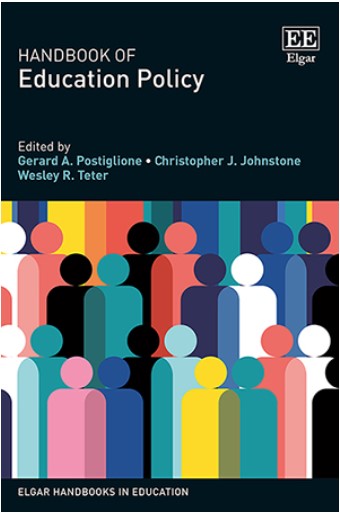
Edited by
Gerard A. Postiglione (Professor Emeritus, Honorary Professor, The University of Hong Kong)
Christopher J. Johnstone (Associate Professor, University of Minnesota, US)
Wesley R. Teter (Research Fellow, Center for Advanced School Education and Evidence Based Research, University of Tokyo, Japan)
Publisher : Edward Elgar Publishing
Click here to learn more about purchasing
Download Leaflet
‘The new Handbook of Education Policy edited by Postiglione, Johnstone and Teter is a welcome addition to the academic literature on the transformation of education policy in the aftermath of the COVID-19 pandemic. The 22 chapters of this well-researched book give a comprehensive analysis of how education policy must adapt to a radically changed world. Through a skilful combination of thematic pieces and case studies from a large range of countries, the chapter authors challenge us to embrace new education policy concepts, such as public value governance and knowledge democratization, that can foster innovation and accountability in times of uncertainty. Gerard Postiglione, Christopher Johnstone, and Wesley Teter should be congratulated for this excellent scholarly contribution that has the potential of influencing policy makers all over the world to design and implement more sustainable and innovative education policies.’
– Jamil Salmi, Diego Portales University, Chile
‘This Handbook combines an up-to-date overview with theoretically-informed analysis of global education policies. It is erudite, insightful and original. It will be a vital resource for education policy researchers and an excellent starting point for students, in any location.’
– Stephen Ball, University College London, UK
This insightful Handbook is an essential guide to educational policy around the world. As shifting geopolitics, intensified climate change, and widening economic inequalities persist, the need for informed educational policy is critical.
Bringing together a unique collection of international case studies by scholars and practitioners from over twenty countries, the Handbook highlights how the contextual nature of educational policy and its implementation acknowledges both global trends and local nuance. Chapters explore key contemporary topics including the effects of the COVID-19 pandemic on international educational policy; opportunities for academic modernization in Ukrainian society; gender equality in Korean and Japanese universities; and inclusive education policies throughout the developing world, including India, South Africa, and Uruguay. It further discusses the ways in which governmental, non-governmental, and global education specialists are shaping new agendas focused on equity and responding to global crises.
Offering new perspectives on educational policy in a post-pandemic world, this comprehensive Handbook will be crucial reading for students and scholars of education policy, politics and public policy, sociology, and university management. It will also be beneficial for educational research associations and international development agencies, including UNESCO, the Asian Development Bank, and the World Bank.
Contents
Foreword xvii
List of abbreviations xix
1 Handbook of education policy: international perspectives in a pandemic age
Christopher Johnstone, Gerard A. Postiglione and Wesley Teter…………………………… 1
2 Conceptualizing global educational policy-making in a (post)COVID-19 world: the past as prologue?
John C. Weidman…………………………………………………………………………………. 14
3 Education policies during the COVID-19 pandemic: scope, efficiency and gaps
Suguru Mizunoya, Garen Avanesian, Sakshi Mishra and Yixin Wang…………………….. 31
4 From the revolution of dignity to a revolution of academic excellence?Paths taken and not taken in Ukraine
Anatoly Oleksiyenko……………………………………………………………………………… 51
5 A complexity theory lens for education policy and its implications
Elizabeth Anne Eppel…………………………………………………………………………….. 68
6 Public value governance
Trygve Throntveit………………………………………………………………………………… 81
7 Investing in education for the common good
Mona Khare……………………………………………………………………………………….. 99
8 Fostering knowledge democratization even against prevailing policies:
blurring boundaries of responsibility
Rodrigo Arocena………………………………………………………………………………… 116
9 Policy enactment and innovation: the role of local actors
James H. Williams and Priyal Gala…………………………………………………………… 129
10 Where is the school going? International trends in educational innovation
Francesc Pedró………………………………………………………………………………….. 147
11 Accountability for policies: introducing twenty-first-century skills goals into education systems
Esther Care………………………………………………………………………………………. 165
12 Accountability elasticity in relation to US federal legislation at the intersection of race and disability
Kathleen King Thorius and Alfredo J. Artiles……………………………………………….. 181
13 Inter-sectoral challenges in higher education policy: incentivizing cooperation and fairness through co-production
Nopraenue S. Dhirathiti………………………………………………………………………… 196
14 The challenges of organizing a sustainable interdisciplinary university curriculum: a research report on the 2012 Hong Kong broadening reforms
Florian Verbeek…………………………………………………………………………………. 208
15 International cooperation in education through multifaceted partnerships
Yuto Kitamura and Akemi Ashida…………………………………………………………….. 229
16 Education for Sustainable Development (ESD) in the context of transformative education
Philip Vaughter and Shinobu Yume Yamaguchi…………………………………………….. 243
17 Unpacking the impact of inclusion and equity policies in South Africa and Ghana
Reitumetse Obakeng Mabokela……………………………………………………………….. 257
18 Is gender equality a policy matter in Korean and Japanese universities?
Challenges for academics in higher education institutions
Yangson Kim…………………………………………………………………………………….. 273
19 Inclusive education: rhetoric or reality in Botswana, E-Swatini, Ethiopia, South Africa and Tanzania?
Sigamoney Naicker…………………………………………………………………………….. 286
20 Towards social justice and inclusion in education systems
Yulia Nesterova………………………………………………………………………………….. 301
21 Transnational policy-making on social and emotional learning in crisis-affected contexts
Jisun Jeong………………………………………………………………………………………. 314
22 Identity and invisibility in policy enterprises: cases of community colleges and global counterparts
Rosalind Latiner Raby and Edward James Valeau ………………………………………… 334
23 Higher education policies and academic entrepreneurialism: conceptual linkages and a contextual approach
Hei-hang Hayes Tang…………………………………………………………………………… 354
2019.09.18
We’re pleased to accounce our new book, which will be published from WorldScientific, Singapore very soon.
Tokkatsu
The Japanese Educational Model of Holistic Education
It is the research outcome of one of our research projects, “The 21st Century International Educational Models Project (Head: Ryoko Tsuneyoshi)”.
It is written primarily for those in the field of education outside Japan, about Tokkatsu, which is a shorthand for Tokubetsu Katsudo, which is the name of a school period but is also used symbolically to mean the Japanese holistic educational model. The book covers several educational activities, such as school cleaning, serving lunch, classroom discussion, etc. in the Japanese schools and explains the educational objectives, how they are situated within the curriculum, how the teachers and staffs collaboratively link the activities to the academic subjects and so on. There is also a chapter about the introduction of Tokkatsu in Egypt, (Tokkatsu +).
—from the website: https://www.worldscientific.com/worldscibooks/10.1142/10781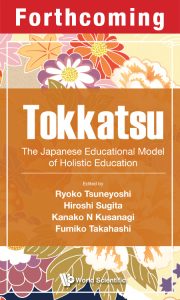
Though there has been much discussion on the academic aspects of Japanese education abroad (e.g., high scores on international tests, lesson study), there has been little information on the non-academic aspects of Japanese schooling. This non-academic aspect is called Tokkatsu (tokubetsu katsudo).
Unlike math and reading, Tokkatsu is not confined to a certain period, but extends throughout the school day and even after-school activities — such as school excursions. It includes classroom activities such as classroom discussions, morning and afternoon meetings that take place daily, cleaning and serving lunch, school events such as sports day, school excursions, student councils, and club activities. Such activities occur every single day, throughout one’s school years, from elementary school (actually, even kindergarten) to high school. They are, however, bound together by the common goals of the Tokkatsu framework.
This book is the foremost attempt to address a gap in English literature on Tokkatsu.
2018.10.30
On October 20, 2018, the Tokkatsu-relevant seminar was held at Santo Yusuf Elementary School, Bandung, Indonesia organized by the Indonesia University of Education and Salib Suci Foundation. The seminar was titled “Intertwining Teachers’ and Students’ Wellbeing: Learning to Grow Together”. The purpose of the seminar was for teachers to be familiar with the holistic model of education, Tokkatsu, and to think of ways to incorporate elements of Tokkatsu into their daily classroom teaching. Professor Ryoko Tsuneyoshi from the University of Tokyo and Professor Kazuhiko Nambu from Bunkyo Gakuin University were invited to give lectures on holistic approaches to education. Professor Tsuneyoshi provided an overview why there is an increasing interest for non-cognitive aspects of learning internationally, and how Tokkatsu activities build foundations for students to learn not only social skills but those skills needed for subject learning. Professor Nambu explained different activities under the Tokkatsu scheme and how building relationships with and among students are key in making learning experience useful. The seminar was attended by 150 participants who were mainly local elementary school teachers.The seminar was partly funded by the Grants-in-Aid for Scientific Research (KAKENHI), Kiban A, No.15H01987, “A Cross-National Research of Japanese Educational Efforts to Meet the Needs of the 21st Century and the Construction of International Models: Exploring Pluralistic Models.” (Head: Ryoko Tsuneyoshi).
In the seminar, two teachers from East Java presented their engagement to Tokkatsu-like activities such as building relationships with students and incorporating collaborative activities within their classrooms. Lesson study has been a popular approach for the professional development of teachers in Indonesia. However, since the didactic style of teaching is common, both students and teachers were not familiar with the collaborative approach to learning. Thus, these teachers used the Tokkatsu classroom activities as a way for students to experience collaborative learning. In the afternoon, teachers were divided into different groups and discussed how to ensure the rights of students to learn and what teachers can do to support the individual learning of students. The seminar participants deepened their understanding to a holistic approach to education and some of them said they were planning to use the approach in their daily classroom activities.
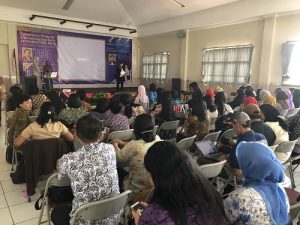
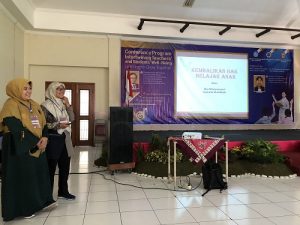
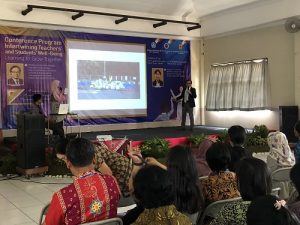
2018.10.29
The seminar “Social and Emotional Learning for Holistic Education in Japan” was held in Indonesia University of Education Serang Campus on October 15, 2018. CASEER Project Researcher Kanako Kusanagi was invited as a speaker to present holistic approaches in Japanese education and its underlying philosophy. She also introduced 3S activities (Seiri (sorting), Seiton (organizing) and Seiso (cleaning)) in companies and how they were promoted not only to maintain safe working environment but also as a way to nurture problem-finding and problem-solving among its employees.
Since Indonesia University of Education Serang Campus began to focus character building and classroom relationship-building in its pre-service training of teachers, there is a strong interest in the holistic model of education. In addition, due to a recent initiative to promote service learning and community cleaning, the University is also interested in how to connect community and educational institutions. The cases of community service and activities of student teachers were also presented in the seminar. The participants were very active and engaging. The seminar was partly funded by the Grants-in-Aid for Scientific Research (KAKENHI), Challenging Research (Exploratory) 18K18627 “School as Learning Community as an approach for Education for Sustainable Development” (Head: Kanako Kusanagi).

2018.03.06
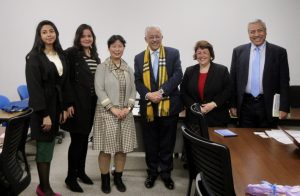
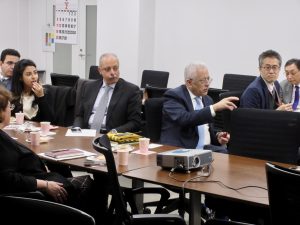
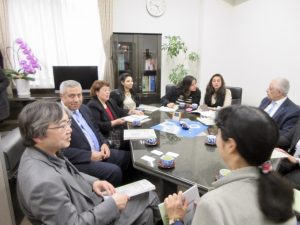
On Tuesday, February 27th in 2018, the Minister of Education, H.E. Dr. Tarek Shawky, Embassy of Egypt in Japan, and five other executives from the Ministry of Education and Technical Education of Egypt, and three officials from Japan International Cooperation Agency (JICA) visited the Graduate School of Education of the University of Tokyo. Professor Hiroshi Sugita from Kokugakuin University and Egyptian Project of JICA was accompanied by them since his lecture and the meeting was on the previous day.
Professor Tsuneyoshi gave a lecture, “Tokkatsu ― Holistic Education Model As Japan Style.” The lecture suggested that tokkatsu is not elitists but its style is rather bottom-up. In this model, cleaning classrooms and homeroom meetings etc. are not isolated, but means a holistic whole in which students make their own decisions through the actions. The lecture included examples of students supporting each other through the experience of stayover excursions, and collaboration during natural disaster, helping elementary school pupils in a nearby school and adults in the neighborhood.
The attendants of the lecture, including the Minister of Education of Egypt, asked questions about the tokkatsu model. They identified what might be difficult to help parents in Egypt understand holistic education in which schools teach students non-cognitive factors, but they wanted to know the first step to start. They asked Professor Tsuneyoshi questions about ways and measures for teacher training for tokkatsu. They were all eager to introduce the Japanese holistic style of education to their own country and to try to find the clue to improve their own style.
OCHI, Yutaka
Special Appointed Associate Professor at Center for Advanced School Education
and Evidence-based Research, Graduate School of Education of the University of Tokyo
2017.03.09
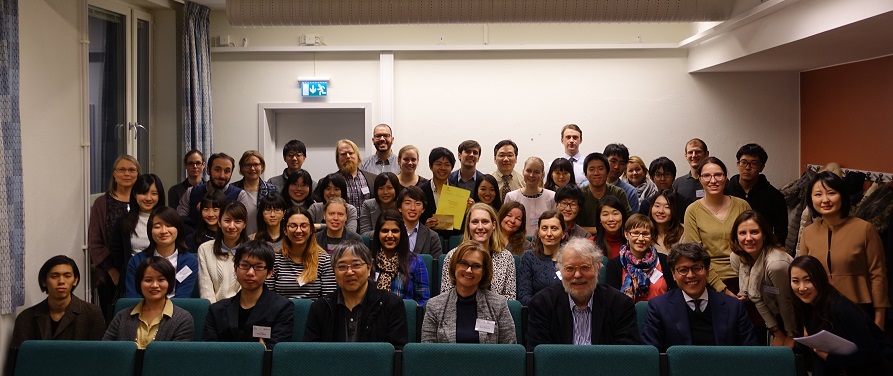
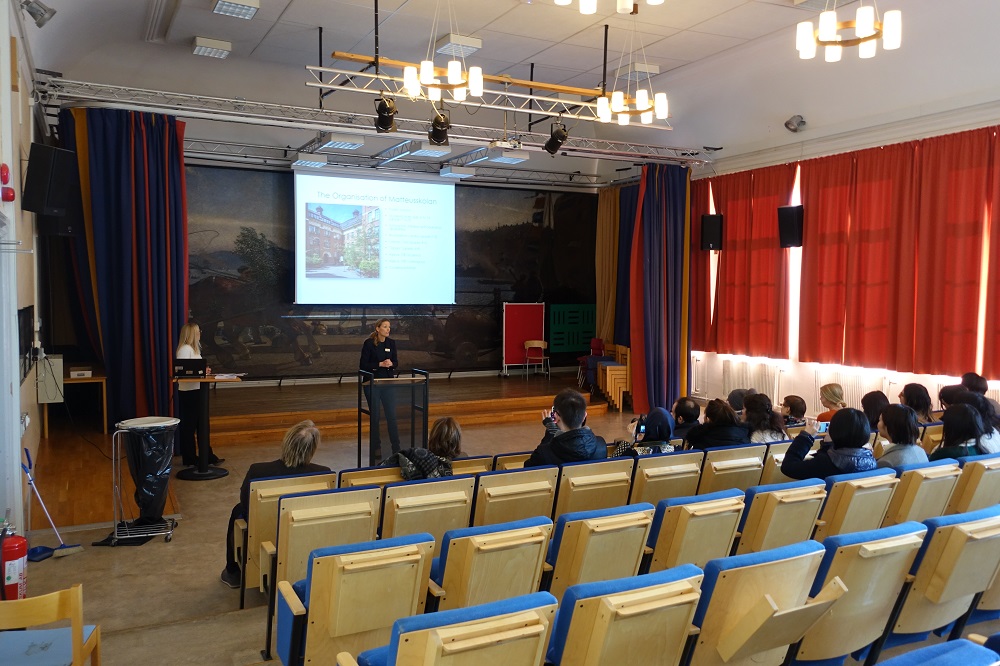

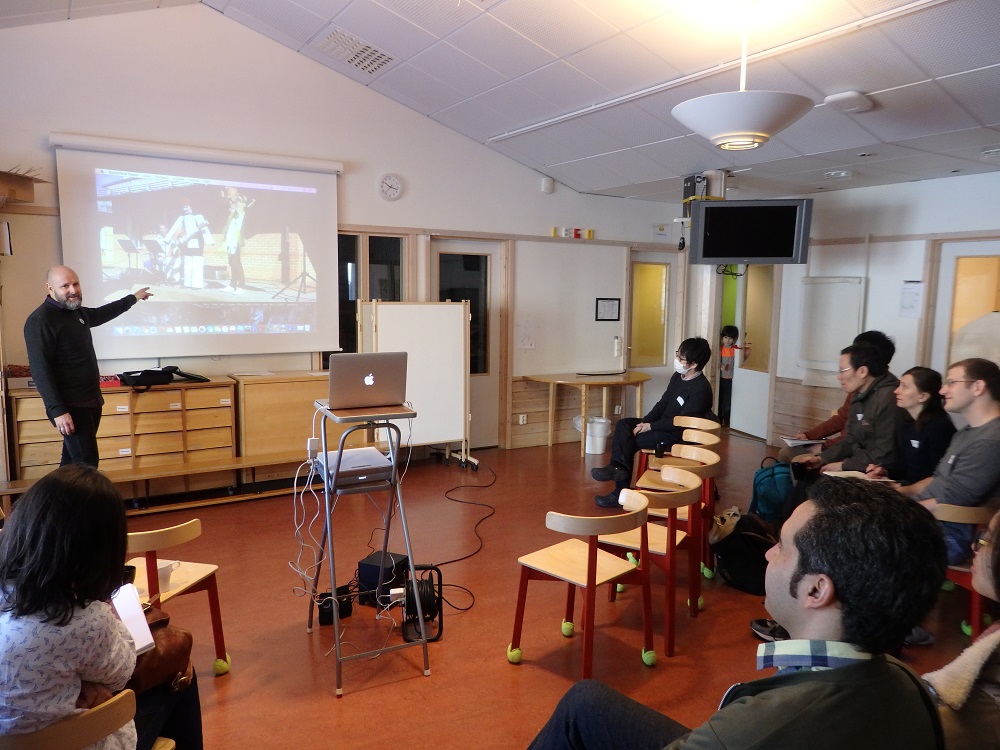
CESE calls for applicants from the doctorate students in the School of Education to participate in Young Scholar Training Program (YSTP) to encourage young researchers to conduct research projects with diverse perspectives. This year, we support eight research projects this year under the topic of “Education for Diversity”.
On February 23, the members of four projects participated an international symposium “Joint International Seminar Education for Diversity” held at the University of Stockholm in Sweden, and presented their final results. The seminar was organized jointly by the University of Tokyo, Stockholm University and Jyväskylä University. In addition to the Faculty of Education at the University of Stockholm, faculty members and students of Jyväskylä University School of Education joined this year. This training was conducted in collaboration with the international exchange “Global Leader Development, Swedish Training Program”.
Active discussions among students took place since they shared common research interests such as inclusive education, multilingual education, and teacher education. Many of the graduate student from the University of Tokyo experienced overseas conference for the first time. There were many international students from the University of Stockholm and the University of Jyväskyla; thus, it was good experience for the students to present in English and experience the atmosphere of diverse culture.
The following is a story of Yusuke Kusunami, the first year doctor student (Division of Professional Development of Teachers, Department of Advanced Research in Education).
I was anxious because it was the first time for me to present in an international seminar. I was not sure if I could present and communicate well with other participants. However, I was interested in the theme of the program “Education for Diversity” and education system in Nordic countries, so I decided to participate in the program. In the program, I was able to discuss with students from various countries such as Canada, Armenia, Ukraine, and Greece as well as Sweden and Finland. The experience of exchanges with students from various countries has led to confidence in conducting research abroad and present at an international conference. Particularly, I realized various educational system reflected the cultural and political background of these country. I also realized the importance of presenting about Japanese education to the international audience. In my group, there were discussions about the trends and issues in inclusive education. I received positive responses for my presentation and was contacted by some of the participants afterwards. I experienced a lot from this program and would like to present and publish internationally in the future.
In addition to the seminar, there were other part of the Sweden Training Program (February 22 to 24). The students from three universities visited cultural facilities and also elementary/junior high schools. The volunteers from Stockholm University accompanied the students from University of Tokyo and they could communicate about their college life and issues in school education. The results of this research will be published as working paper of our center. not only research presentations but also university and school life introduction were conducted, and students from 3 universities also visited cultural facilities in the city and elementary and junior high schools together It was. At the school we also had a chance to observe the lessons and witnessed the multilingual and multicultural environment of the Swedish school and it appeared stimulated. Also, Stockholm University students guided the beautiful city of Stockholm, the exchange of students at the three universities further deepened, and there seemed to be opportunity to talk about each other’s research contents and student life. I hope to make use of my experiences in this training in the future to make presentations at overseas academic conferences and to submit articles to academic journals.
(Yusuke Kusumi, the participant of Young Scholar Training Program, and Kanako Kusanagi, Project Researcher of Center for Excellence in School Education)
2016.09.09
Working papers written by Ph.D students of YSTP (Young Scholar Training Program) last year are released.
CESE calls for graduate students’ research projects from the doctorate students in Education once a year in order to encourage the young researchers and their studies from various perspectives. In 2015, they conducted research under the topic, “School Education in the Globalization Era”.
The outcome of the research by the three individuals’ and two groups’ are on Working Paper Series in Young Scholar Training Program .







